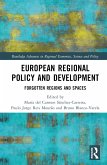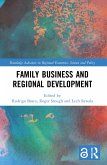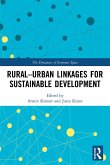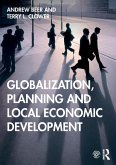The study of universities' role in regional engagement has traditionally been focusing on exceptional cases. This book presents a reconceptualization which embraces its underlying complexity and proposes a roadmap for a renewed research agenda. Starting from the grassroots level of universities' "everyday" engagements, the book delves into the manifold ways in which university knowledge agents build connections with regional partners.
Through 11 empirical chapters, the authors not only chart the diversity among case institutions, engagement mechanisms, and regional contexts but also use that diversity to advance a novel conceptual framework, centered on the process of mundaneness, for unpacking university-regions' everyday activities, taking into account the dynamic, complex, and co-evolving interplay between (a) key social agents and institutions, (b) the contexts in which they are embedded, as well as (c) the historical trajectories and strategic ambitions underpinning context-specific social arrangements and interactions that are mediated by temporal and spatial dimensions.
Drawing on evolutionary economic geography, innovation studies, management and organization studies, and historical perspectives, the volume advances a new mode of understanding university-regional engagement as a form of extendable temporary coupling, which also helps to address perennial policy and managerial questions alike of what to do with universities that do not serve local labour market needs and/or are located in regions suffering from brain drain. The book illustrates such dynamics from diverse national contexts and three continents: Brazil, Caribbean, China, Italy, Norway, and Poland.
This book will be valuable reading for advanced students, researchers, and policymakers working in economic geography, regional development, innovation, and higher education management.
The Open Access version of this book, available at www.taylorfrancis.com, has been made available under a Creative Commons Attribution-Non Commercial-No Derivatives 4.0 license.
Through 11 empirical chapters, the authors not only chart the diversity among case institutions, engagement mechanisms, and regional contexts but also use that diversity to advance a novel conceptual framework, centered on the process of mundaneness, for unpacking university-regions' everyday activities, taking into account the dynamic, complex, and co-evolving interplay between (a) key social agents and institutions, (b) the contexts in which they are embedded, as well as (c) the historical trajectories and strategic ambitions underpinning context-specific social arrangements and interactions that are mediated by temporal and spatial dimensions.
Drawing on evolutionary economic geography, innovation studies, management and organization studies, and historical perspectives, the volume advances a new mode of understanding university-regional engagement as a form of extendable temporary coupling, which also helps to address perennial policy and managerial questions alike of what to do with universities that do not serve local labour market needs and/or are located in regions suffering from brain drain. The book illustrates such dynamics from diverse national contexts and three continents: Brazil, Caribbean, China, Italy, Norway, and Poland.
This book will be valuable reading for advanced students, researchers, and policymakers working in economic geography, regional development, innovation, and higher education management.
The Open Access version of this book, available at www.taylorfrancis.com, has been made available under a Creative Commons Attribution-Non Commercial-No Derivatives 4.0 license.
"The growth and significance of universities and education more widely, has become ever more important in stimulating innovation and economic developments across nations and regions. This edited book provides a perspective into how higher education institutions and other agents operate by using a unique three tier macro, meso and micro lens to view such relationships and the interplay of universities and educational providers with their external environment. This book is both timely and rewarding to the reader in providing such a rich conceptual framework and it covers a wide and diverse set of case studies across the globe." - Jeremy Howells, Professor and Dean of the Faculty of Business and Law, University of Portsmouth
"For too long, the academic and practitioner debate on the role of universities has focused on a narrow view of commercialisation and knowledge exchange, drawing from a limited number of 'best practice' cases. This edited book offers a necessary and timely counterview to this idealised picture. It focuses instead on the 'mundaneness' of universities' regional engagement, unpacking their complex and context specific institutional arrangements, practices and interactions. It is a must-read for scholars and practitioners interested in understanding regional development, innovation and higher education in real places." - Elvira Uyarra Professor of Innovation Studies, University of Manchester
"This is a very welcome book which expands the discussion of universities' regional engagement both thematically and geographically by going beyond the well-known cases to explore the mundane, but important, regional engagement activities of a wide range of universities. Universities and their academics engage with regional actors in a myriad of ways, most of which go under the radar both in policy-making and in research. This book is a step towards redressing this imbalance." - Rune Dahl Fitjar, Pro-rector for Innovation and Society and Professor of Innovation Studies, University of Stavanger
"This book is important because it conceptualizes and provides examples of the broad range of mundane activities that makes up the majority of linkages between a university and its region. These everyday engagements connecting universities with their region are often neglected, while the attention has been on extraordinary cases of highly innovative regions and the commercialization of research with high economic impact. The chapters in this book are of great value for understanding how typical universities can engage with their region in a profound way." - Einar Rasmussen, Professor of Technology Management, Nord University
"For too long, the academic and practitioner debate on the role of universities has focused on a narrow view of commercialisation and knowledge exchange, drawing from a limited number of 'best practice' cases. This edited book offers a necessary and timely counterview to this idealised picture. It focuses instead on the 'mundaneness' of universities' regional engagement, unpacking their complex and context specific institutional arrangements, practices and interactions. It is a must-read for scholars and practitioners interested in understanding regional development, innovation and higher education in real places." - Elvira Uyarra Professor of Innovation Studies, University of Manchester
"This is a very welcome book which expands the discussion of universities' regional engagement both thematically and geographically by going beyond the well-known cases to explore the mundane, but important, regional engagement activities of a wide range of universities. Universities and their academics engage with regional actors in a myriad of ways, most of which go under the radar both in policy-making and in research. This book is a step towards redressing this imbalance." - Rune Dahl Fitjar, Pro-rector for Innovation and Society and Professor of Innovation Studies, University of Stavanger
"This book is important because it conceptualizes and provides examples of the broad range of mundane activities that makes up the majority of linkages between a university and its region. These everyday engagements connecting universities with their region are often neglected, while the attention has been on extraordinary cases of highly innovative regions and the commercialization of research with high economic impact. The chapters in this book are of great value for understanding how typical universities can engage with their region in a profound way." - Einar Rasmussen, Professor of Technology Management, Nord University









